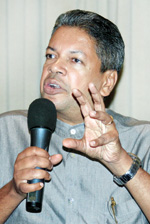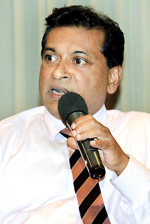Outsourcing, insourcing and precarious labour issues at Colombo discussion
View(s):A Colombo discussion on Monday on ‘labour issues and outsourcing trends’ triggered a debate on the meaning, definition and misconception of the word “outsourcing”. The three panellists at the monthly meeting of the Sunday Times Business Club (STBC) held on Monday at the Cinnamon Lakeside hotel, sometimes agreed, sometimes differed in their views on outsourcing.
At the end of the day (end of the meeting) however there appeared to be a clearer understanding of outsourcing, its advantages and disadvantages.

Buddhima Padmasiri
The panel comprised Ajantha Dharmasiri, Director and the Chairman of the Board of Management of the Postgraduate Institute of Management, University of Sri Jayawardenapura, Ravi Peiris, Director General/CEO, Employers Federation of Ceylon and Buddhima Padmasiri from the Collective for Economic Democratisation and their task was to analyse new trends in labour inclusive of outsourcing, temporary workers and the future of permanent employment.
Dr. Dharmasiri said outsourcing was not labour sourcing and noted that there was some misconception about what it meant.
He referred to the current existence of BPOs (Business Process Outsourcing), and said this activity has been there for many decades. He cited the example of the gardener, carpenter, security guard and other services that households and companies have sought over the years.
“The popular perspective is that outsourcing is a cost cutting mechanism but it is also because of a dearth of skills in that particular area of activity,” he said. Dr. Dharmasiri argued that unions could find fault and say this is a form of exploitation but the reality is that this practice has come to stay and the next step is in finding a right balance that would be beneficial to all a stakeholders.
Referring to the time when he was attached to Nestle, he said that the company outsourced labour but ensured that the providing company followed strict guidelines laid down by the company to ensure some equitability between permanent workers and hired workers.

Dr..Ajantha Dharmasiri
Ravi Peiris also spoke on the misconception of the definition of outsourcing and said this is used liberally and loosely. He said outsourcing is where a company doesn’t get involved, for example, in the packaging segment of the business and asks a third party to handle this part. “Hiring outside labour is not outsourcing. But if you have two sets of workers (permanent and temporary) doing the same type work but on different terms and paid differently, then you would have a problem,” he said adding that under common law if workers do the same work but are paid differently, that becomes an issue.
Ms. Padmasiri defined outsourcing as precarious forms of employment which is a problem both for workers and the society.
She said the whole idea of outsourcing and ‘insourcing’ labour has prevailed in Sri Lanka since the 1980s with economic liberalisation, especially in garment factories and other export-oriented production. Subcontracting was used as a strategy to reduce production costs by hiring cheap and flexible labour. But at present, the precarious workers, workers who are employed on temporary contracts for various durations has become a serious issue, she argued.

Ravi Peiris
Precarious employment is visible in both high end and low end employment and at present, ‘manpower workers’ referring to workers who are in-sourced by a company through manpower agencies, a category of precarious form of employment, has become one of the most crucial issues facing labour.
She said at Sri Lanka Telecom (SLT) 27.2 per cent of the workers are precarious workers and quoted a union leader of the Bank Employees Union as saying that one-fifth of the workers in the state banks are manpower workers. She said 92 per cent of all temporary workers are in the private sector and added that at SLT, the minimum salary of a permanent worker can be as much as four times the manpower worker. Even in the banking sector the manpower workers obtain only one third of the pay received by permanent workers.
“If this (outsourcing/manpower workers’ trend) continues at the same pace, the future of workers is grim. Workplaces will have zero accountability towards the employee, and create a serious social and economic crisis for workers,” she said. Globally in business, outsourcing is defined as contracting out a business process to another party.
According to another definition, outsourcing is an arrangement in which one company provides services for another company that could also be or usually have been provided in-house. The club’s monthly meeting is co-sponsored by Commercial Bank and hosted by Cinnamon Lakeside.


